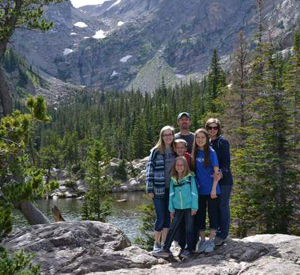Few would imagine that three lives could be saved by a teen’s nosebleed. Yet the incredible chain of events, impossible as it seems, is true. Crystal Enns from Wylie, Texas was diagnosed with a rare kidney disease when brought to the doctor for an incessant nosebleed. Dr. Albert Quan, a pediatric nephrologist at Medical City Children’s Hospital in Dallas who treated Crystal, explained to ABC News, “This kind of kidney disease doesn’t get better. In mid- to late-adolescence you either have . . . to put her on dialysis or you have to [get her a] kidney transplant.”
Crystal, then 14 years old, didn’t want to think that that might happen. Thus began what she and her family considered a test of faith.
Her parents were the first to volunteer as candidates for donation, but their situation only grew more frightening. Screening processes revealed that both her mother and father had kidney cancer.
Mark, Crystal’s father, said, “The idea is that we’re going to go in and do something that can be life-saving for our daughter, only to be told ‘this may have saved your life,’ because I would never have been tested otherwise.”
Even stranger is the fact that according to doctors, Crystal’s nosebleed had no connection to her kidney disease. Dr. Quan reassures parents that a typical nosebleed is no cause for alarm. Crystal’s condition was revealed through standard lab tests, making her nosebleed a mere red herring. The Enns family believes that it was no coincidence, for it inspired the entire process through which she and her parents were diagnosed with life-threatening illnesses.
Countless people came alongside Crystal and her family as they navigated the new challenges of restoring health. Fortunately for Crystal’s parents, their kidney cancer was caught early enough to be treated with an operation, and no chemotherapy was required. They were able to put all their strength toward supporting Crystal who, as years passed, grew unable to do the things she loved, such as singing in her school choir.
The procedure of finding a viable donor was long and took much patience, but at last, when Crystal was 17, her aunt was able to donate a kidney for transplant. “The morning after the transplant, she woke up and said, ‘I’m not nauseous!’” recalls Cristy, Crystal’s mother. “She could eat, she was hungry . . . it was such an answer to prayer.”
Now Crystal is once again healthy and able to pursue her love for music. She and her family are extremely grateful for God’s provision. “You try to think, ‘Where’s the good in this?’ as people of faith. ‘What am I supposed to learn?’” Mark said. “We got to see the good side.”
Sources: ABC News, CBS News


